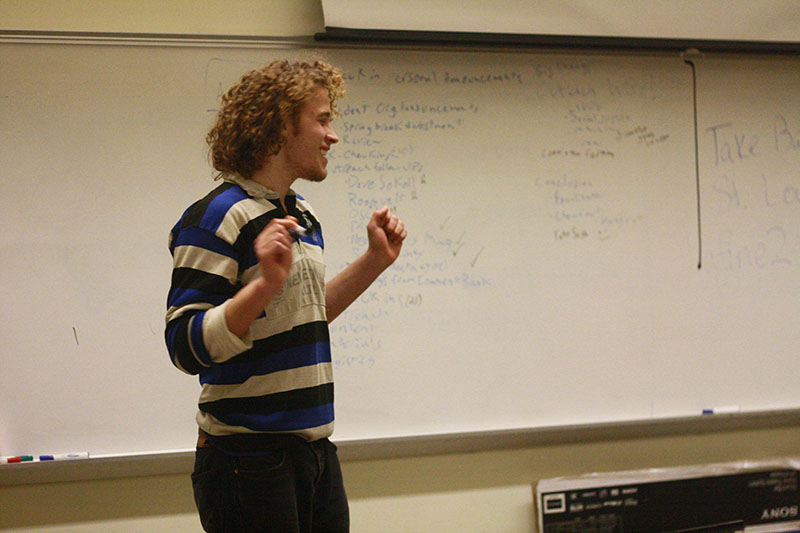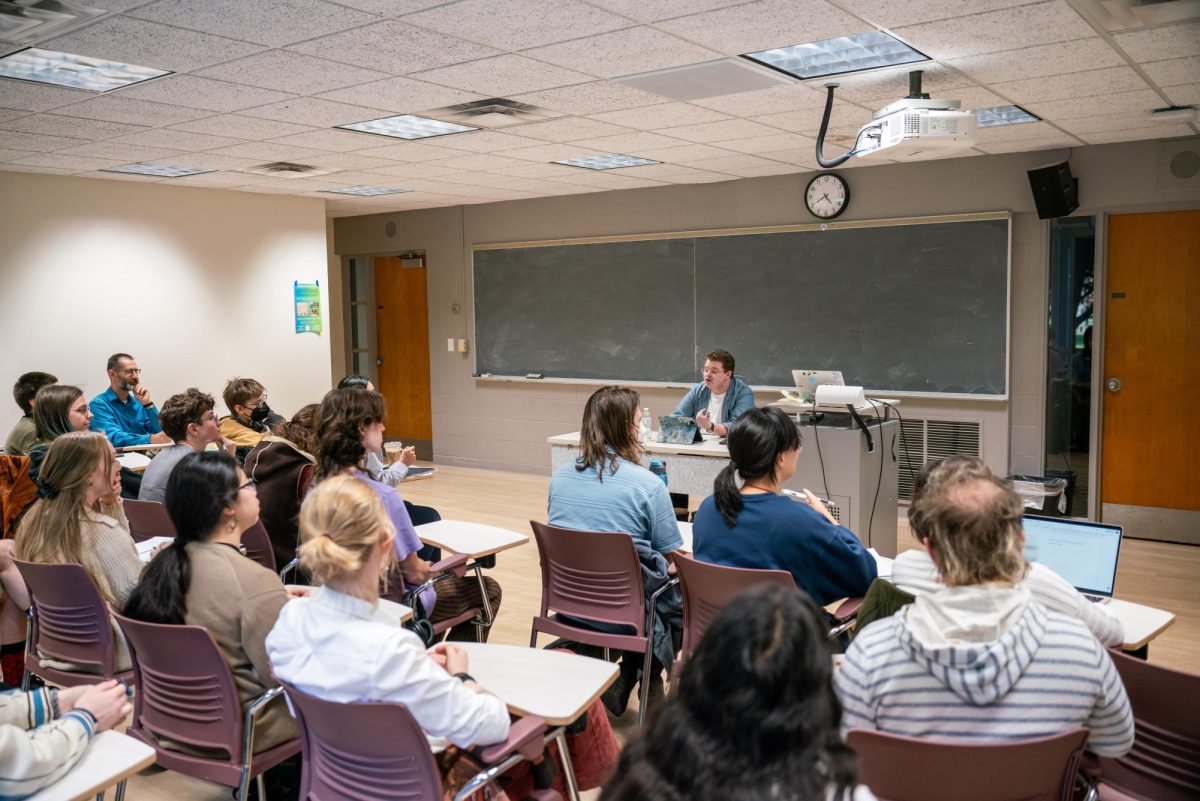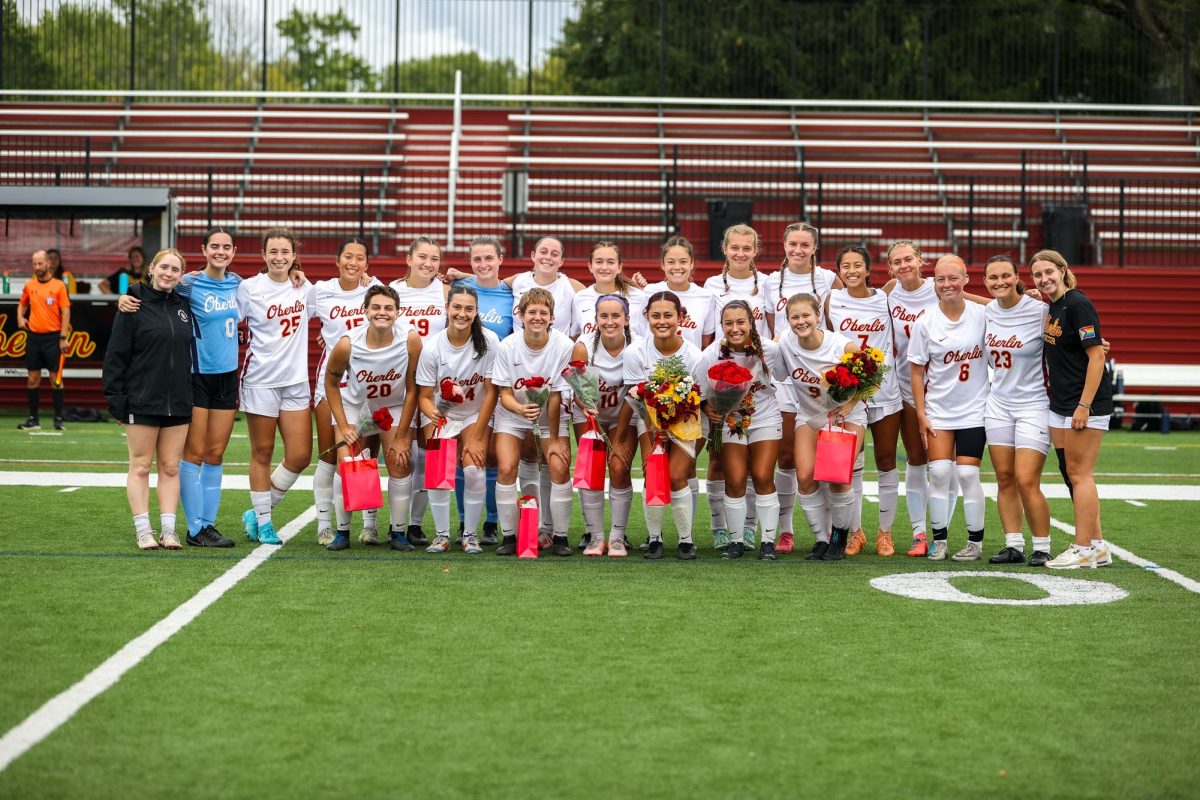RIO Investment Symposium To Seek Community Consensus
College junior Andrew Follman leads students at a RIO meeting on Thursday night. The organization will host a responsible investing symposium on March 8 and 9.
February 28, 2014
Although it was excluded from this month’s College-sponsored Oberlin Symposium on Divestment, the student-led Responsible Investing Organization will host its own symposium on March 8 and 9 to discuss community standards for ethical investment in hopes of forming a consensus on investment practices.
“Our money should be invested in companies that operate legally and ethically, not [companies] that exploit human labor and [contribute] heavily to environmental degradation, such as fossil fuel companies,” said College junior and RIO member Andrew Follman.
Founded in the spring of 2012, RIO is a student-led group dedicated to increasing accountability and transparency in investment practices.
“We are trying to make the Oberlin community more aware of the ethical implications of its investments,” said Follman.
Although an ambitious goal for a single symposium, RIO has invited numerous student groups, guests and an open forum for students and community members to participate in the
conversation. Organizations such as Oberlin Anti-Frack, Oberlin Zionists, J Street U and Students for a Free Palestine have been invited to reinforce RIO’s mission to “have no public political stance,” according to College first-year and RIO member Ema Sagner. The organization also hopes its upcoming symposium will represent “what Oberlin wants,” as the event will be open to the entire community.
RIO recently determined its “five percent-one percent” plan; the organization’s goal is “to have five percent of the school’s endowment invested responsibly. Of that five percent, we want one percent to go to impact investment, which is direct investment for community development,” said Sagner.
According to Follman and Sagner, what will ultimately be deemed “responsible” will depend on the Policy Committee’s reception to the workgroup discussions that will take place during the two-day long symposium. The event will also include four guest alumni lecturers who specialize in environmental and public health investment projects and policy.
Throughout campus, concerns have been raised over RIO’s endorsement of “shareholder activism.” The term refers to the belief that “an investor’s choice of whether to invest or not invest in a company is a form of political power” according to College sophomore Ziya Smallens, a RIO member and student senator. According to Smallens and College sophomore Ben Hyams, the controversy derives from a campaign to divest from Israeli companies and boycott Israeli goods.
“I know many members of RIO, and I know that their private views lie with divestment,” said Hyams. “It is my concern that those who campaign most zealously for Israeli divestment are perceived to have the prevailing opinion rather than to simply be the loudest people. This is a legitimate concern that many students and faculty members may share.”
As RIO’s initiatives remain in their early stages, the debate regarding responsible investment persists throughout the community.
“It’s not that simple,” said Smallens. “Divestment is in many ways the most crude form of socially responsible investing. You’re just withdrawing money; better to use your money as leverage to encourage more ethical behavior on the part of multinational corporations, Israeli or otherwise. Besides, if it is a true community standard, it will not be one that excludes the voices of Jewish students. That is why we invited so many student activist groups.”
“I am very interested in what the administration has to say,” said Hyams. “Is it that there are no morals with money? I think their perspective is probably more nuanced than that.”
According to The Source, “Oberlin College’s Endowment has a highly diversified portfolio with allocations to hedge funds, private equity and real assets, which include venture capital, real estate and private energy.”
Many hope the organization’s upcoming symposium will clarify both the position of the administration and that of RIO. One poignant criticism of RIO that will probably remain is this:
“They need a new name,” said College sophomore Eli Steiker-Ginzberg. “It sounds like the city in Brazil. Confuses me.”



















